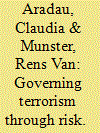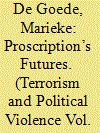|
|
|
Sort Order |
|
|
|
Items / Page
|
|
|
|
|
|
|
| Srl | Item |
| 1 |
ID:
076864


|
|
|
|
|
| Publication |
2007.
|
| Summary/Abstract |
The events of 9/11 appeared to make good on Ulrich Beck's claim that we are now living in a (global) risk society. Examining what it means to 'govern through risk', this article departs from Beck's thesis of risk society and its appropriation in security studies. Arguing that the risk society thesis problematically views risk within a macro-sociological narrative of modernity, this article shows, based on a Foucauldian account of governmentality, that governing terrorism through risk involves a permanent adjustment of traditional forms of risk management in light of the double infinity of catastrophic consequences and the incalculability of the risk of terrorism. Deploying the Foucauldian notion of 'dispositif', this article explores precautionary risk and risk analysis as conceptual tools that can shed light on the heterogeneous practices that are defined as the 'war on terror'.
|
|
|
|
|
|
|
|
|
|
|
|
|
|
|
|
| 2 |
ID:
159896


|
|
|
|
|
| Summary/Abstract |
Proscription of individuals and groups potentially linked to terrorism in the form of targeted sanctions have become increasingly controversial in recent years, especially in Europe. Initially considered the less violent alternative when countering terrorism, individual proscriptions have become contested for their impact on due process rights and democratic space. This paper focuses on a key aspect of proscription measures that goes relatively unnoticed: its discourses and practices of time and temporality. It analyses in some depth the rationalities of time evoked, debated, accepted, and rejected in two court cases on individual sanctions. It focuses on two elements at work in these cases: first, the relation between the precautionary and the punitive; second, the politics of establishing and examining terrorist intention. In this manner, it contributes to broader literatures on proscription in two ways. First, it advances the debate on security temporalities in general and the discussion of future-oriented sanctions in particular, by focusing on recent cases and case-law. Second, the paper brings a focus on legal practice to proscription debates. The paper concludes that the juridical repertoire of establishing and assessing intentions is not just broadened but fundamentally altered in the current proscription regime.
|
|
|
|
|
|
|
|
|
|
|
|
|
|
|
|
| 3 |
ID:
093673


|
|
|
|
|
| Publication |
2009.
|
| Summary/Abstract |
This paper looks at the way in which the idea of the Precautionary Principle, increasingly influential in environmental and other policy areas, is being and might be used in foreign and security policy. It aims to contrast the relative precision with which the term is used in the environmental arena with the current usage in international relations. Contrasting the Precautionary Principle with ideas of precaution, prevention, pre-emption and similar terms in post-structuralist analyses of risk, humanitarian intervention and US foreign policy in the aftermath of 11 September 2001, the paper identifies costs and benefits in deploying a more carefully specified account of the Precautionary Principle. In particular, it highlights key issues of regulatory authority and the way in which policy-makers and analysts understand and respond to the limits of knowledge and knowledge systems as important challenges to which careful use of the Precautionary Principle can potentially contribute. The paper concludes by suggesting that both policy-making and policy analysis could potentially be improved by adapting and extending the idea of the Precautionary Principle as it is deployed in other policy arenas.
|
|
|
|
|
|
|
|
|
|
|
|
|
|
|
|
|
|
|
|
|